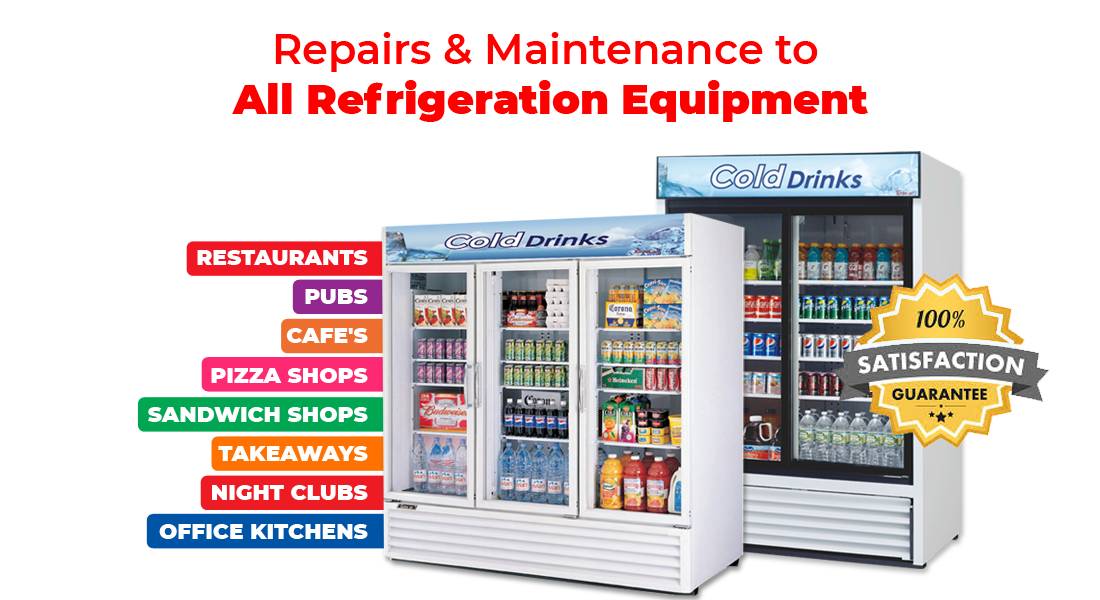Optimizing Efficiency: Commercial Refrigeration Repair Techniques for Cost-Effective Solutions

Assessing Refrigeration System Efficiency
To properly review the efficiency of an industrial refrigeration system, it is vital to conduct thorough analyses of its crucial elements and functional parameters. The initial step in assessing system efficiency is analyzing the performance of the compressor. The compressor plays an important duty in preserving the wanted temperature within the refrigeration unit. Issues with the compressor can bring about poor air conditioning, temperature variations, and boosted power consumption. Performing regular examinations and performance examinations on the compressor can assist identify prospective issues early on and stop costly breakdowns.
Additionally, assessing the condenser and evaporator coils is paramount. Filthy or clogged coils can considerably impact the system's efficiency by hindering warmth transfer procedures. Cleaning the coils consistently and ensuring correct air movement around them can maximize the system's cooling ability and decrease energy intake. Keeping an eye on cooling agent degrees and pressures is additionally important in evaluating system efficiency. Reduced refrigerant degrees or irregular stress can indicate leaks or malfunctioning components that need instant attention to avoid system failings and costly repair work. By methodically assessing these operational specifications and essential components, organizations can ensure their industrial refrigeration systems run at peak efficiency levels, decreasing downtime and making best use of power effectiveness.

Carrying Out Preventative Maintenance Procedures
Evaluating the performance of a business refrigeration system gives valuable understandings that can inform the implementation of preventative upkeep actions crucial for maintaining optimum capability and long life. Preventative upkeep is a proactive approach targeted at determining and dealing with potential concerns prior to they escalate right into pricey troubles that interrupt procedures. By developing a normal upkeep routine, refrigeration systems can run successfully, lowering energy usage and decreasing the danger of unexpected malfunctions. Secret preventative maintenance steps include examining and cleaning condenser coils, checking cooling agent degrees, guaranteeing proper air flow, and calibrating temperature level controls. Additionally, keeping track of temperature and humidity degrees, inspecting door seals, and attending to any uncommon noises or odors quickly are essential steps in preventative upkeep. Applying these measures not just expands the life expectancy of the tools yet also improves food safety and security by maintaining constant storage temperature levels. Inevitably, spending in preventative maintenance procedures is a cost-effective method that aids companies stay clear of pricey repair services and downtime, making sure dependable and constant refrigeration system efficiency.
Identifying Common Refrigeration Issues
One of the crucial elements in maintaining commercial refrigeration systems is promptly determining typical issues that may emerge during their operation. One common problem is insufficient cooling, typically triggered by dirty condenser coils or a read more malfunctioning compressor. Routine cleaning of the condenser coils and guaranteeing proper ventilation around the system can aid prevent this concern. An additional common concern is refrigerant leakages, which can cause inefficient air conditioning and possible ecological threats. Monitoring cooling agent degrees and conducting regular evaluations for leaks can assist alleviate this problem. Furthermore, defective gaskets on doors, causing air leakages, can trigger the refrigeration system to work tougher to preserve the desired temperature. Normal evaluation and substitute of harmed gaskets are necessary to stay clear of energy waste. Unusual sounds such as knocking, clanking, or hissing might indicate underlying mechanical concerns that need instant interest to avoid additional damage. By without delay determining and resolving these common refrigeration concerns, companies can make certain the efficient operation of their systems and decrease costly repair work.
Utilizing Energy-Efficient Repair Service Strategies
When considering business refrigeration fixing, applying energy-efficient strategies is critical to maximizing the system's performance and decreasing functional costs. Among the vital methods in achieving power effectiveness is making sure that the refrigeration system is properly maintained. Routine upkeep, such as cleaning condenser coils, checking for cooling agent leakages, and adjusting temperature settings, can significantly boost power performance.
One more energy-efficient repair work method is upgrading to high-efficiency elements - commercial refrigerator repair. By replacing older, helpful hints less efficient parts with energy-efficient alternatives, such as ECM fan motors or LED lights, services can decrease energy usage and lower utility prices. Furthermore, mounting programmable thermostats and energy monitoring systems can aid manage temperatures better, stopping unnecessary power use
Additionally, optimizing the system's insulation and sealing any kind of leakages can additionally add to energy financial savings. Proper insulation assists maintain regular temperature levels within the refrigeration device, decreasing the work on the system and boosting overall effectiveness. By integrating these energy-efficient repair service strategies, companies can not just minimize their environmental effect yet also achieve long-term cost savings.
Optimizing Refrigeration System Life Expectancy
To ensure the long life and optimum performance of commercial refrigeration systems, preserving energy-efficient repair service practices is important, with an emphasis now moving towards making best use of the refrigeration system life expectancy. Maximizing the life-span of a refrigeration system includes aggressive upkeep, prompt repair work, and adherence to producer guidelines.
Furthermore, informing staff on proper system operation and maintenance techniques can add to the long life of the devices. Training workers to report any uncommon sounds, leakages, or changes in efficiency can aid in capturing troubles in their preliminary phases. Furthermore, investing in top notch components and components throughout repair services and substitutes can enhance the durability of the refrigeration system. By prioritizing proactive upkeep and making use of top quality elements, businesses can maximize the life-span of their business refrigeration systems, eventually decreasing downtime and operational costs.
Conclusion
Finally, by frequently evaluating refrigeration system efficiency, applying preventative upkeep actions, recognizing usual additional hints refrigeration issues, using energy-efficient repair techniques, and optimizing the system's life expectancy, services can take full advantage of effectiveness and minimize prices related to industrial refrigeration repair. These cost-efficient remedies assist to make certain that refrigeration systems run at peak efficiency, eventually bring about enhanced performance and success for services in the future.

When taking into consideration industrial refrigeration fixing, applying energy-efficient methods is vital to enhancing the system's performance and lowering functional costs.To guarantee the longevity and ideal performance of commercial refrigeration systems, preserving energy-efficient fixing techniques is vital, with an emphasis now shifting towards maximizing the refrigeration system life expectancy. Enhancing the life expectancy of a refrigeration system includes proactive upkeep, timely repairs, and adherence to producer standards.
Comments on “Specialist Suggestions on Commercial Refrigeration Repair for Toronto Companies”